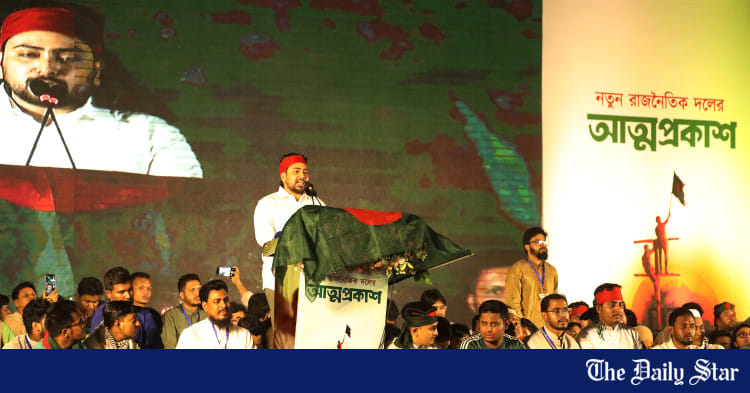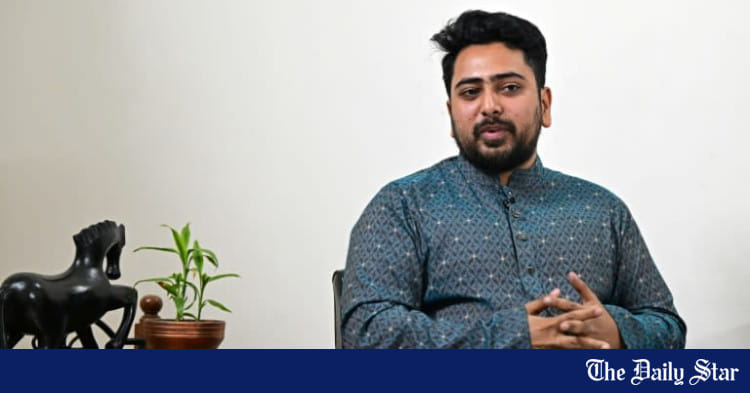Saif
Senior Member
- Messages
- 15,397
- Nation

- Axis Group


National Citizen Party: Transparency, accountability a must
We welcome the new party. Every aspect of the party’s activities, including its financing, must uphold the highest standards of transparency and accountability.
National Citizen Party: Transparency, accountability a must
Editorial Desk
Published: 02 Mar 2025, 12: 02
Despite the presence of a record number of political parties in Bangladesh, the democratic framework has not been effectively consolidated. One of the primary reasons for this is that political parties have consistently prioritised personal and group interests over national interests. As a result, they have failed to fulfill the hopes and aspirations of the people.
In this context, it is essential to evaluate the newly formed National Citizens Party, which was established on Friday. The majority of the individuals leading this party played a prominent role in last year’s July-August mass uprising. The leaders of this new party are all young, with youthful enthusiasm and vitality serving as their principle strengths.
At the inaugural event, the party’s leader pledged to replace divisive politics with a politics of unity. They committed to establishing a Second Republic by drafting a new constitution through a constituent assembly election, as well as rebuilding the collapsed political, social, economic and cultural institutions. The declaration expresses a firm commitment to ensuring democracy, equality, human dignity and social justice through a new ‘political settlement’.
Their statement emphasised that this newfound independence achieved through sacrifice of thousands of martyrs was not merely for replacing one government with another. Rather it is essential to dismantle the fascist system and reconstruct a rights-based state for the people. The declaration also highlights the necessity of replacing dynastic politics with a leadership selection process based on merit and competence, while ensuring the inclusion of marginalised communities in the mainstream of society.
If we look back at history, we will see that in every mass movement and uprising in this country, the youth have played a leading role. In this regard, the Language Movement of 1952 is particularly noteworthy. When the senior leadership took a stance against breaking section 144, it was the students who defied the order, sacrificing their lives to secure the rights to their mother tongue. The youth were also at the forefront of the mass uprising of 1969 and 1990.
However, despite these two uprisings, political power did not remain in the hands of the youth. The leaders of the anti-authoritarian movement in 1990 did not adhere to the framework of the three alliances they had announced. Those who assumed power prioritised personal and group interests rather than serving the nation. The establishment of a fascist system was facilitated by the suppression of people’s voting rights in three elections.
In this political reality, the youth’s call for a new political settlement will undoubtedly inspire hope among the public. While not everyone may fully agree with all the programmes and commitments outlined by the new party, there can be no disagreement with their aspiration to replace division with unity, retribution with justice, uplift marginalised communities and establish leadership based on merit and competence across all levels of society and the state.
We welcome the new party. However, we would also like to remind them that their proposed political settlement will only succeed if they can free themselves from the weakness and flaws of traditional politics. Every aspect of the party’s activities, including its financing, must uphold the highest standards of transparency and accountability.
Likewise, the selection of leadership must follow a democratic process. One of the major weaknesses of our political culture is the tendency to attempt to establish democracy in the country while operating undemocratic parties. We would like to believe that the new party will not follow this path.
Editorial Desk
Published: 02 Mar 2025, 12: 02
Despite the presence of a record number of political parties in Bangladesh, the democratic framework has not been effectively consolidated. One of the primary reasons for this is that political parties have consistently prioritised personal and group interests over national interests. As a result, they have failed to fulfill the hopes and aspirations of the people.
In this context, it is essential to evaluate the newly formed National Citizens Party, which was established on Friday. The majority of the individuals leading this party played a prominent role in last year’s July-August mass uprising. The leaders of this new party are all young, with youthful enthusiasm and vitality serving as their principle strengths.
At the inaugural event, the party’s leader pledged to replace divisive politics with a politics of unity. They committed to establishing a Second Republic by drafting a new constitution through a constituent assembly election, as well as rebuilding the collapsed political, social, economic and cultural institutions. The declaration expresses a firm commitment to ensuring democracy, equality, human dignity and social justice through a new ‘political settlement’.
Their statement emphasised that this newfound independence achieved through sacrifice of thousands of martyrs was not merely for replacing one government with another. Rather it is essential to dismantle the fascist system and reconstruct a rights-based state for the people. The declaration also highlights the necessity of replacing dynastic politics with a leadership selection process based on merit and competence, while ensuring the inclusion of marginalised communities in the mainstream of society.
If we look back at history, we will see that in every mass movement and uprising in this country, the youth have played a leading role. In this regard, the Language Movement of 1952 is particularly noteworthy. When the senior leadership took a stance against breaking section 144, it was the students who defied the order, sacrificing their lives to secure the rights to their mother tongue. The youth were also at the forefront of the mass uprising of 1969 and 1990.
However, despite these two uprisings, political power did not remain in the hands of the youth. The leaders of the anti-authoritarian movement in 1990 did not adhere to the framework of the three alliances they had announced. Those who assumed power prioritised personal and group interests rather than serving the nation. The establishment of a fascist system was facilitated by the suppression of people’s voting rights in three elections.
In this political reality, the youth’s call for a new political settlement will undoubtedly inspire hope among the public. While not everyone may fully agree with all the programmes and commitments outlined by the new party, there can be no disagreement with their aspiration to replace division with unity, retribution with justice, uplift marginalised communities and establish leadership based on merit and competence across all levels of society and the state.
We welcome the new party. However, we would also like to remind them that their proposed political settlement will only succeed if they can free themselves from the weakness and flaws of traditional politics. Every aspect of the party’s activities, including its financing, must uphold the highest standards of transparency and accountability.
Likewise, the selection of leadership must follow a democratic process. One of the major weaknesses of our political culture is the tendency to attempt to establish democracy in the country while operating undemocratic parties. We would like to believe that the new party will not follow this path.




